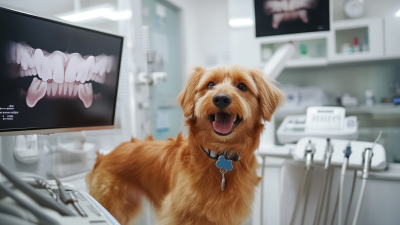Dog Dental Treats have gained significant attention in the pet care industry as an effective tool for promoting oral health in dogs. According to the American Veterinary Dental College, approximately 80% of dogs show signs of dental disease by the age of three, highlighting the need for preventive measures. Research has indicated that the mechanical action of chewing on dental treats can help reduce plaque and tartar buildup, contributing to healthier gums and teeth. Moreover, a study published in the Journal of Veterinary Dentistry found that dogs that were regularly given dental treats had a 50% lower incidence of periodontal disease compared to those that were not. This underscores the importance of integrating Dog Dental Treats into a regular dental care routine for pets, not only to enhance their overall health but also to improve their quality of life. As pet owners increasingly seek effective ways to combat oral hygiene issues, understanding the science behind Dog Dental Treats becomes essential in making informed choices for their furry companions.

 Dental health is a crucial aspect of overall well-being for dogs, and dental treats play an essential role in maintaining oral hygiene. Research indicates that approximately 80% of dogs show signs of dental disease by the age of three, highlighting the need for preventive measures. Dental treats are specifically designed to reduce plaque and tartar buildup, helping to combat these prevalent issues. According to a study published by the Veterinary Journal, dogs that regularly consumed dental chews exhibited a significant reduction in plaque accumulation compared to those that did not.
Dental health is a crucial aspect of overall well-being for dogs, and dental treats play an essential role in maintaining oral hygiene. Research indicates that approximately 80% of dogs show signs of dental disease by the age of three, highlighting the need for preventive measures. Dental treats are specifically designed to reduce plaque and tartar buildup, helping to combat these prevalent issues. According to a study published by the Veterinary Journal, dogs that regularly consumed dental chews exhibited a significant reduction in plaque accumulation compared to those that did not.
The mechanism behind these dental treats is rooted in their texture and formulation. The abrasive nature of these treats helps to mechanically scrape away plaque as the dog chews, while certain ingredients can neutralize bacteria that lead to tartar formation. A survey conducted by the American Veterinary Medical Association (AVMA) revealed that 70% of pet owners believe that dental treats are effective in promoting their dogs' oral health. Additionally, the Veterinary Oral Health Council (VOHC) has established guidelines to certify products that have demonstrated efficacy in reducing dental disease, providing pet owners with reliable options to support their dogs' dental care routine.
Canine dental diseases are alarmingly common, impacting a significant percentage of dogs in the pet population. Statistics indicate that approximately 80% of dogs show signs of dental disease by age three. This highlights the urgent need for proactive dental care among pet owners. Conditions such as periodontal disease not only affect the teeth and gums but can also lead to more severe health issues affecting the heart, liver, and kidneys if left untreated.
To promote optimal oral health, consider incorporating dental treats into your dog's routine. These treats are specifically designed to reduce plaque and tartar buildup while providing a yummy reward for your furry friend. When selecting dental treats, look for products approved by veterinary dental organizations, as they are often formulated to deliver the best results.
Additionally, regular dental check-ups are essential. Just like humans, dogs benefit from professional cleanings to prevent the progression of dental diseases. Combine these check-ups with daily or weekly brushing using pet-friendly toothpaste to maintain your dog's oral health, ensuring a happy and healthy life for your furry companion.
When choosing effective dental treats for your dog, it’s essential to focus on the ingredients that contribute to their oral health benefits. High-quality dental chews typically include components such as chelating agents, which help reduce plaque and tartar buildup, and abrasives that mechanically clean the teeth as the dog chews. Additionally, some treats may be enriched with enzymes and natural ingredients designed to target bad breath and promote healthier gums, which enhances overall dental hygiene.

Veterinary recommendations often highlight the importance of combining dental treats with daily tooth brushing to achieve the best results for your pet’s oral health. While these treats can assist in cleaning teeth and satisfying your dog's natural chewing instincts, they should not replace traditional dental care practices. Therefore, when selecting dental treats, look for those that are scientifically formulated and vet-approved to ensure they provide tangible benefits to your dog's mouth while also keeping your furry friend excited during treat time.
When selecting dental treats for your dog, considering their size and age is crucial. Smaller breeds might struggle with larger treats, leading to choking hazards or digestive issues. Conversely, large breeds require appropriately sized treats that can withstand their stronger jaws. It's essential to choose treats that are designed specifically for your dog's size to ensure they can chew without risk and get the intended dental benefits.
Age also plays a significant role in choosing dental treats. Puppies, for example, have different nutritional needs and dental requirements compared to adult dogs or seniors. When selecting treats for a puppy, opt for softer varieties that are easy on their developing teeth and gums. For older dogs, selecting treats that are not only gentle on their teeth but also contain ingredients that support joint health can address the unique health concerns that come with aging. By matching treats to your dog's size and age, you can enhance their oral health more effectively while ensuring they enjoy their treats safely.
This chart illustrates the perceived effectiveness of dental treats on the oral health of dogs based on their size and age. Small dogs report the highest effectiveness, while senior dogs demonstrate the lowest. Choosing the right dental treat tailored to your dog's characteristics can have a significant impact on their oral hygiene.
Regular use of dental treats can significantly influence the frequency and nature of vet visits, thereby impacting overall oral health costs for pet owners. According to the American Veterinary Dental College, approximately 80% of dogs show signs of dental disease by the age of three. Investing in dental treats can help prevent this issue, potentially reducing the need for expensive veterinary dental cleanings, which can cost anywhere from $300 to over $1,000 depending on the extent of the treatment required. By integrating dental treats into a pet's routine, pet owners can help maintain their dog’s oral hygiene while potentially lowering future vet costs.
Tips for selecting the right dental treats include looking for products approved by the Veterinary Oral Health Council (VOHC), which ensures that the treats have been proven effective in reducing plaque and tartar. Always monitor your pet’s dental health and consult a veterinarian if you notice any signs of discomfort or dental disease. Regular brushing, combined with the use of dental treats, can create a comprehensive oral health plan that supports your pet’s well-being.
It's also essential to understand that dental treats should complement, not replace, regular veterinary check-ups. Routine dental examinations can help identify any underlying issues early, allowing for more effective and less costly treatments. By establishing a proactive dental care routine, pet owners can foster healthier mouths and potentially save on veterinary expenses in the long run.





